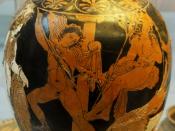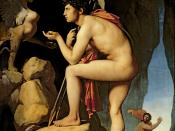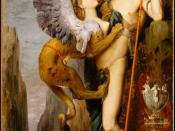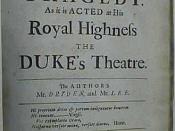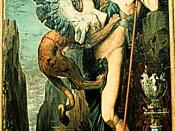We here the word 'tragedy' in news articles and daily conversations but what is tragedy? To some people it could be a common man such as Willy Loman, from Death of a Salesman or to others it would be mighty Oedipus, from Oedipus. Who does our society consider in ideal tragic model? Each person's viewpoint differs based on his own personal experiences with society. A common man is just as strong a tragic model as a great man because the common man suffers as much or even more than a great man. Miller supports this idea when he says, "it is time, I think, that we who are without kings, took up this bright thread of our history and follow it to the only place it can possibly lead in our time--the heart and spirit of the average man." In these two plays we ponder upon the ideas of which of these two characters is more tragic a man.
When examining the tragic elements of each play we see neither man is a more perfect tragic model than the other.
Fate and free will were powerful life forces for both character. Oedipus was tragically doomed by fate at birth when it was foretold by Apollo that he would kill his father and marry his mother. Oedipus felt that he could escape his fate, relaying his own free will. However, his choices led him directly to his fate. In Willy's world, fate was not predetermined by the gods but by society. He was doomed to failure to reach his dreams of being a successful and well-liked salesman because he could not be accepted the way he was. He tried to improve his life through hard work and lies, but the lies trap him in the end. He made as much money in the end of his job as he did when he started because he believed his own lies as did his family, only for awhile. He was no further ahead at the end than when he began his career. Linda clearly shows this when she says, "A small man can be just as exhausted as a great man. He works for a company thirty-six years this Marh, opens up unheard-of territories to their trademark, and now in his old age they take his salary away...He's been on straight commission, like a beginner, an unknown!" Both characters suffer greatly because of their own character flaws. Oedipus let his anger get the best of him. Instead of letting the old man pass at the crossroads, he rentlessly killed him. In his effort to take care of "his people", to have them look up to him, his pride in his own power allows him to condemn himself. Oedipus is rejected by the people he wanted to take care as he is cast out blind and friendless. Willy's inability to face reality forces him to lie and create an illusionary world, causeing him to be cast out and friendless also. He can't take care of his family. His dreams of seeing his son become successful dims, as his son drifts aimlessly. He wants his son Biff, to look up to him, but again his lies cause him to lose his son's respect, his own self-respect, and eventually his job. Toward the end he realizes that he has accomplished nothing. "A man can't go out the way he came in, Ben. A man has got to add up to something." He only sees one way left..Suicide. "Funny..After all the highways, and the trains, and the appointments, and the years, you end up worth more dead than alive." He lived everday trying to think that his cruel world didn't exist, but no one can live in dreams forever.
Oedipus was commited to his nation. When the plague struck he stood by, seeking a way to help his people. He could have left but he began seeking all possible knowlege to end the terrible plague. Willy, too, was very commited to his family. He worked hard to earn money for his sons to help them on with their life but working so hard he never got a chance to enjoy them. Linda points out to her sons, .."but you don't have to be very smart to know what his trouble is. The man is exhausted." Both men faced the truth in their own ways. When confrotned with the truth Oedipus gouged out his eyes and begged them to send him away, where he could cause no more harm, instead of dying, as he himself had decreed. "Banish me from this country as fast as you can-where no man can see me or speak to me." Willy also banishes himself from those he loves through suicide. Willy was a smart man, and died heroically. He died for money and most of all for the love of his family. When he killed himself his family would then recieve a big sum of money. With this money he thought Biff would use to go on and be a big success. At his funeral he thought people would come from all over just for the death of Willy Loman. In the same way, Oedipus lived in a world in which he saw through his own eyes. He saw himself a great man. In the time of the great plague he thought he would be the savior when actually his sins were causing the sickness and pain of his people. Even when hinted that he was the one causing such disaster he shrugged off the idea. He saw himself the leader of the people, one greatly admired, not one who would cause any unhappiness. He came to the people in time of need and solved the Sphinx's riddle, and became their king when there was none. The Priest states, "YOu came to us once and liberated our city, you freed us form the tribute which we paid that cruel singer, the Sphinx. You did this with no extra knowledge you gor form us, you had no training for the task, but, so it is said and we believe, it was with divine support that you restored our city to life." Yet, even this world was shattered by the truth. Facing his sins he cursed the gods, but did not lay down to die. He gouged out his eyes so as not to see his doing and begged them to send him away, to die by himself where he could cause no more harm.
Both Oedipus and Willy's world came crashing down upon them. We feel for each man, but even more so for Willy. He had his reson to die, but even in the end his plan didn't work as expected. At his funeral no one except his family and best friend Charlie shoed up. Even Happy said, "Where's all the people?" The family felt for Willy. He worked so hard and accoplished so little. Even his dream for Biff to take the money fell to pieces. Instead Happy was the one who said he was going to make something of his life, and wasn't going to turn into Willy. Biff left. He went back out to his ranch in California, and back to being just a rancher. The impact of this play wa amazingly stroung. The reader feels for this man whose life was so common. He was an ordinary working joe with a family and wife to support. As any man, Willy had big dreams, but to see them come crashing down upon him left the reader with a sense of pity for the poor man. To us he seemed like some crazy man who had lost his mind. A guy who'd had it rough and simply couldn't take it anymore. Willy's character hits gome in all of us; this is why we feel so strongly for him.
To others, Oedipus's character also rings close to home. The power he so quickly received fell apart just as quickly as he got it. He thought himself the helper of the people, but was faced with the cruel truth of the sins of killing the king, his father, and marrying his mother. A cruel fate he thought to have avoided. We feel for him for he was curesed with a fate, yet undboubtedly tried to avoid it. But no matter what he did he couldn't get away from it. His struggle brings a sense of sadness form the reader toward this trying man. For he didn'lt take his destiny sitting down. He left into a country he did not know to find a life away from the one he thought would cause people harm.
No matter which man you consider the more ideal tragic model, each book was written excellently, leaving the reader impacted; whether with pity or disgust. Both follow Aristotle's idea of a perfect tragedy.."A perfect tragedy should..imitate actions pity and fear...". It is plain to see no matter if the man is a commoner or all mighty when it comes down to suffering each can suffer as gravely as the other. If you combine two men's strengths and weakness only this will make a perfect tragic hero. With each reader it differs. To one Oedipus might be the greater tragic model, ot to another, Willy. Who do you consider the more ideal tragic model?
